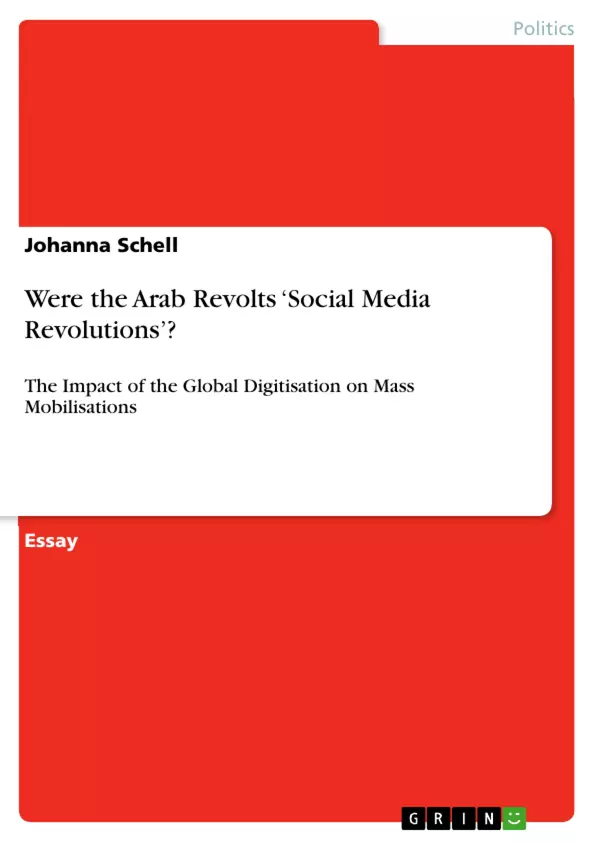This essay aims at analysing the impact of globalisation on the Arab Revolts. It does so by focussing on one of the most influential outgrowths of globalisation: the digital revolution and the thereof resulting emergence of social media. Instead of carrying out a general approach the analysis will focus on two selected countries, namely Egypt and Bahrain. Although trying to find an answer to the well known question if the Arab revolts were or weren’t a social media revolution the present paper tries to concretise this initial question in splitting it into sub-question which reflect the three possible meanings it implies: First, did the Arab revolts start in social media? Second, was social media a means to the end for the Arab revolts? Last, was social media the main venue of the revolts?
Inhaltsverzeichnis (Table of Contents)
- Introduction
- Theoretical Framework
- The Use of Social Media during the Revolts
- Egypt
- Bahrain
- Weak Networks and Western Views...
- Conclusion......
Zielsetzung und Themenschwerpunkte (Objectives and Key Themes)
This essay aims to analyze the impact of globalization on the Arab Revolts by focusing on the digital revolution and the emergence of social media. It examines the role of social media in the uprisings in Egypt and Bahrain, exploring whether the Arab revolts were “Social media revolutions.”
- The impact of globalization on the Arab Revolts
- The role of social media in mass mobilization
- The use of social media in Egypt and Bahrain
- The relationship between social media and political contestation
- The resource mobilization theory and its application to the Arab revolts
Zusammenfassung der Kapitel (Chapter Summaries)
The introduction discusses the debate surrounding the role of social media in the Arab revolts and outlines the essay's approach. The theoretical framework section explores the concept of social media and its connection to political contestation, drawing on the resource mobilization theory and its modifications. The chapter on the use of social media during the revolts provides a brief overview of the employment of social media in Egypt and Bahrain.
Schlüsselwörter (Keywords)
The primary keywords and focus topics of this essay include: Arab Revolts, social media, digital revolution, globalization, resource mobilization theory, Egypt, Bahrain, political contestation, mass mobilization.
Frequently Asked Questions
Were the Arab Revolts truly "Social Media Revolutions"?
The essay explores this by analyzing whether the revolts started in social media, if social media was a means to an end, or if it was the main venue of the uprisings.
Which countries are focused on in this analysis?
The analysis focuses specifically on the revolts in Egypt and Bahrain.
What is the impact of globalization on the Arab Revolts?
Globalization contributed through the digital revolution and the emergence of social media, which facilitated mass mobilization and political contestation.
What theoretical framework is used to explain the role of social media?
The essay applies the Resource Mobilization Theory to understand how social media served as a tool for organizing and executing the revolts.
Did the revolts start on social media platforms?
This is one of the sub-questions addressed, examining the initial spark of the protests and the extent to which digital networks were the primary origin.
- Quote paper
- Johanna Schell (Author), 2014, Were the Arab Revolts ‘Social Media Revolutions’?, Munich, GRIN Verlag, https://www.grin.com/document/279554



